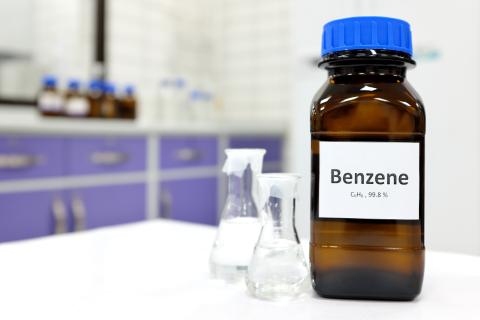Benzene
What is benzene?
Benzene is a chemical that is naturally produced by volcanoes and forest fires. However, benzene is more commonly used in industrial processes to make plastics, resins, synthetic fibers, lubricants, dyes, and more.
Benzene is also found in many consumer products, including gasoline, glues, cleaning products, and paint thinners.
How can I be exposed to benzene?
People can be exposed to benzene from air, direct contact, and drinking water.
Air
People mainly breathe benzene from tobacco smoke, vehicle exhaust, and industrial emissions. Smoking tobacco and second-hand smoke are major sources of benzene exposure. People can also be exposed to benzene in air from using products that contain benzene. Additionally, people who work in places where benzene or products containing benzene are made or used can be exposed to it in air.
Direct contact
People who work in places where benzene is used or made can make or use benzene or benzene-containing products can be exposed to benzene through direct contact it gets on their skin.
Drinking water
People who live near places where benzene is used or was spilled or disposed of in the past can be exposed to benzene from drinking water. If levels are high enough, people can also breathe in benzene vapors that come out of the water when it is used to shower, bath, and run the dishwasher and washing machine.
How can benzene affect my health?
Breathing in high levels of benzene in a short period of time can cause drowsiness, headaches, and dizziness. Direct contact of benzene on the skin can cause skin redness and sore. Short-term exposure of benzene in eyes can cause general irritation, but longer-term exposure can damage to the cornea.
Long-term exposure to lower levels of benzene from air or water can increase the risk of leukemia, cause anemia, weaken the immune system, and impact reproduction and fertility.
How can I protect myself from benzene?
Use precaution when working with gasoline.
- Store gasoline it in air-tight containers and avoid breathing in the vapors.
- When filling containers and machinery, take them outside to allow for ventilation.
Limit contact with tobacco smoke.
- Avoid smoking in the house, in enclosed areas, and near children.
- Check our our help to quit page for resources on overcoming tobacco addiction.
When using gasoline or other products that contain benzene, wear gloves and long sleeves and follow all directions on the product label.
If you get the gasoline or a benzene product on your skin, wash the area with plenty of soap and water. Seek medical attention if skin irritation or a rash occurs.
If you get gasoline o a benzene product in your eyes, rinse with water for several minutes. Remove contact lenses, if present and easy to do, and continue rinsing. Seek medical attention if eye irritation continues.
Public water users
Community water systems are required to test for benzene on a regular basis. If the level of benzene is above Wisconsin's drinking water standard, your water system will issue a public notice.
The public notice will include information on the levels detected, the actions that the system is taking to address the problem, and any steps that you should take to reduce your benzene exposure.
Private well users
Test your well for benzene if you live near a landfill, gas station, or dry cleaner. Complete a VOC panel using a Wisconsin certified lab.
If the benzene level is between 5 and 100 micrograms per liter (µg/L):
- Use a different source of water for drinking and preparing foods that take up a lot of water. Options include bottled water, water from a well without issues, and water from a public system without violations.
- Find a long-term solution. Options include installing a certified treatment device and drilling a new well.
Our Water Treatment Devices for Private Well Contaminants fact sheet, P-45012 (PDF), has information on common certified treatment devices and instructions for how to find them.
The Wisconsin Department of Natural Resources (DNR) well compensation grants provide funds to address public health hazards in private wells.
If the benzene level is above 100 micrograms per liter, email DHSEnvHealth@dhs.wisconsin.gov for assistance in evaluating your risks and determining the appropriate next steps.
Who regulates benzene?
The Department of Natural Resources (DNR) regulates how much benzene can be released into the air, surface water (lakes, rivers, and streams), and groundwater in Wisconsin.
DNR has set a residential indoor air vapor action level (VAL) for benzene.
DNR regulates how much benzene can be in water served by public water systems and oversees the clean up of contaminated sites.
Related topics
Our groundwater standards page has information on how Wisconsin's groundwater standards are set, DHS' role in the process, and a summary of the current and recommended standards, including benzene.
The Wisconsin Groundwater Coordinating Council's annual report to the Legislature summarizes the operations and activities occurring within the state to address groundwater issues including information VOCs such as benzene.
The DNR provides more information on how residential indoor air vapor action and screening levels are set.
The DNR's Bureau of Remediation and Redevelopment Tracking System on the Web (BRRTs on the Web) provides information on contaminated properties and other cleanup and redevelopment activities in Wisconsin including benzene sites.
The Agency for Toxic Substances and Disease Registry's ToxFAQs page has more information on benzene exposure routes and health effects.

